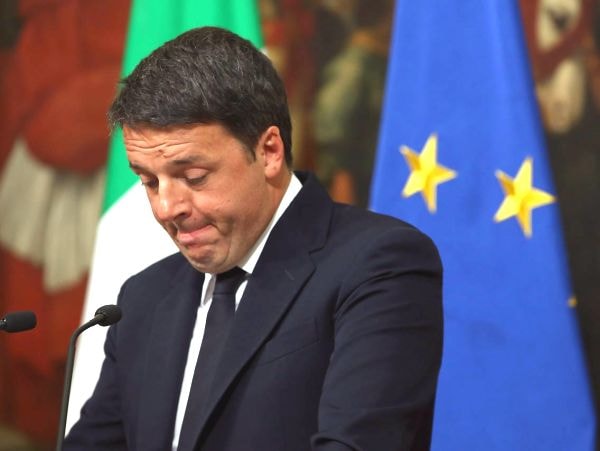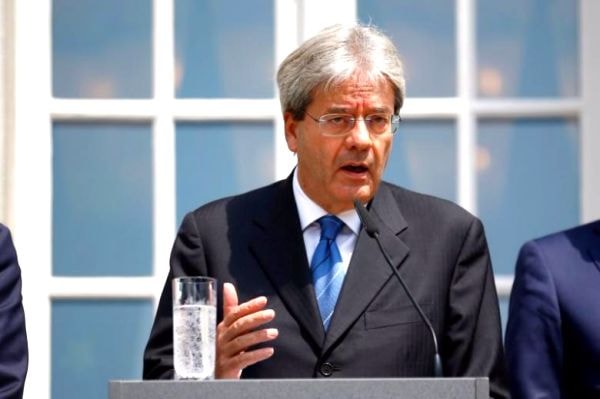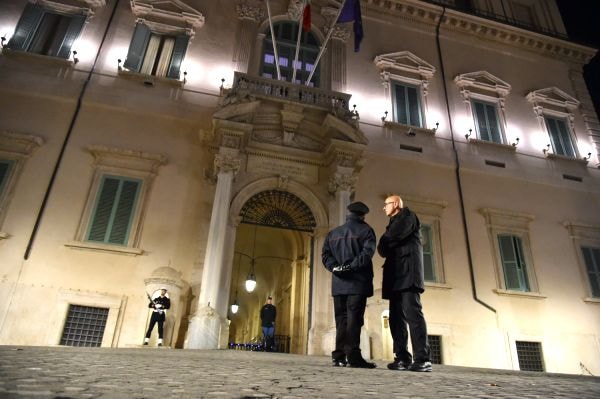Pressure on Rome
(Baonghean) - The possibility of Italy's recently resigned Prime Minister Matteo Renzi being reappointed as head of the Government in Rome has resurfaced. The current situation of the boot-shaped country does not allow for a power vacuum to appear. The country needs to quickly resolve its internal problems.
Situational solution
Italian media last weekend revealed the possibility that Prime Minister Matteo Renzi, who had just announced his resignation, would return to run the Government. After 3 days of consultations with political party leaders, Italian President Sergio Mattarella pledged on the evening of December 10 that “in the coming hours”, he would make assessments and decide who would be the next Prime Minister of Italy to resolve the political crisis in the country.
The point that President Mattarella wants to emphasize is that Italy needs a new government as soon as possible to solve the country's problems, such as the troubled banking system, the earthquake-ravaged cities that need to be rebuilt. These are more urgent needs than ever, before the entire political system finds a way out of the current conflicts.
 |
| Prime Minister Matteo Renzi resigned after failing to amend the Constitution and is being considered for reappointment. (Photo: Barrons.com) |
However, any new government would have to push ahead with reforming Italy's electoral laws before a general election is held. It is an imperative task that comes with urgent work. The candidates considered capable of leading Italy include Foreign Minister Paolo Gentiloni, Finance Minister Carlo Padoan, Infrastructure and Transport Minister Graziano Delrio and Senate President Pietro Grasso.
Although he has just submitted his resignation as Prime Minister after the referendum on constitutional reform on December 4, people still do not rule out the possibility that Mr. Matteo Renzi can be reappointed. In fact, Mr. Matteo Renzi is currently temporarily taking on the role of Government executive while waiting for a replacement to be appointed.
Preparation for the future
The question is how did such a seemingly paradoxical scenario come about? Firstly, Italy is still looking for stability at the top. Any short-term or long-term lapse in the system is undesirable.
According to statistics, in the past 8 years, Italy has gone through 4 prime ministers. The country's economy has also been in a fragile recovery phase since the middle of last year after escaping the most severe and longest recession since World War II. No one wants to go back to the time when the Italian economy hit rock bottom in the second quarter of 2011 with public debt accounting for 133% of gross domestic product (GDP). So, what needs to be done now is to find someone with enough courage to continue the chosen path.
 |
| Foreign Minister Paolo Gentolini is considered the most promising candidate to succeed Mr. Renzi. (Photo: Financial Times) |
Second, the task of reforming the electoral law remains. It should be considered an urgent matter, as important as running the economy. The referendum two weeks ago reiterated this. This is due to the fact that the Eurozone skepticism and anti-immigration sentiment are growing in Italy. This makes the recent vote in this country a “political torture”, making the possibilities even more complicated.
The most prominent representatives of these trends are the two main opposition parties that oppose Mr Renzi’s reform plans: the anti-establishment Five Star Movement (M5S) and the anti-immigration Northern League (LN). These two blocs hope to hold a referendum on Italy’s membership of the eurozone.
In the wake of the Brexit debacle in the UK, there is a growing fear in Rome that if these or other euro-skeptic forces manage to hold power in the next general election, it could set the stage for a referendum on the euro, which would then make Italy’s exit from the Eurozone only a matter of time. This is of course a hypothetical scenario with a low probability of happening, but no one can be sure that Italy will remain part of the EU.
 |
| The Italian public is waiting for news from the Presidential Palace in Rome to know the choice of the head of the Italian Government. |
So Italians must act now to prevent that future. The first step is to prevent separatist and conservative views from emerging in Parliament through elections. Under the Electoral Law passed in 2015, the party that wins an election with more than 40% of the vote automatically gets 55% of the seats.
If no party wins 40% of the vote, the two highest-ranking parties will advance to a second round. The next prime minister may seek to replace this with a proportional representation system, which would force parties to form coalitions and reduce the M5S’s chances of gaining power. The M5S has long refused to form coalitions with other parties, which would give it a say in the decision-making process.
Only with food can one practice religion.
Regardless of who governs in Rome in the coming months, and whether or not the Italian electoral law is amended, “bread and butter” will continue to dominate political trends in this southern European country. And whichever political party or politician can convince voters of that, they will have the power to change it. Indeed, while Italy’s economy has passed its perilous phase, there are still frustrations and insecurities. Slow growth, high unemployment and public skepticism about traditional Italian institutions could lead to the rise of protest movements and populism.
The two sources of improvement for the banking system, economic growth and political stability, have not yet shown their role. Therefore, it is not surprising that the banking sector in Italy is still struggling to escape the huge burden of bad debts of 360 billion euros. The problem of reforming and restructuring the capital of the banking system continues to be a challenge for Italy, otherwise the economic reputation of this country will continue to decline.
The recent referendum was a warning to Italy. The country's problems have been seen. The new government will have the responsibility to deal with them./.
Thanh Son
| RELATED NEWS |
|---|

